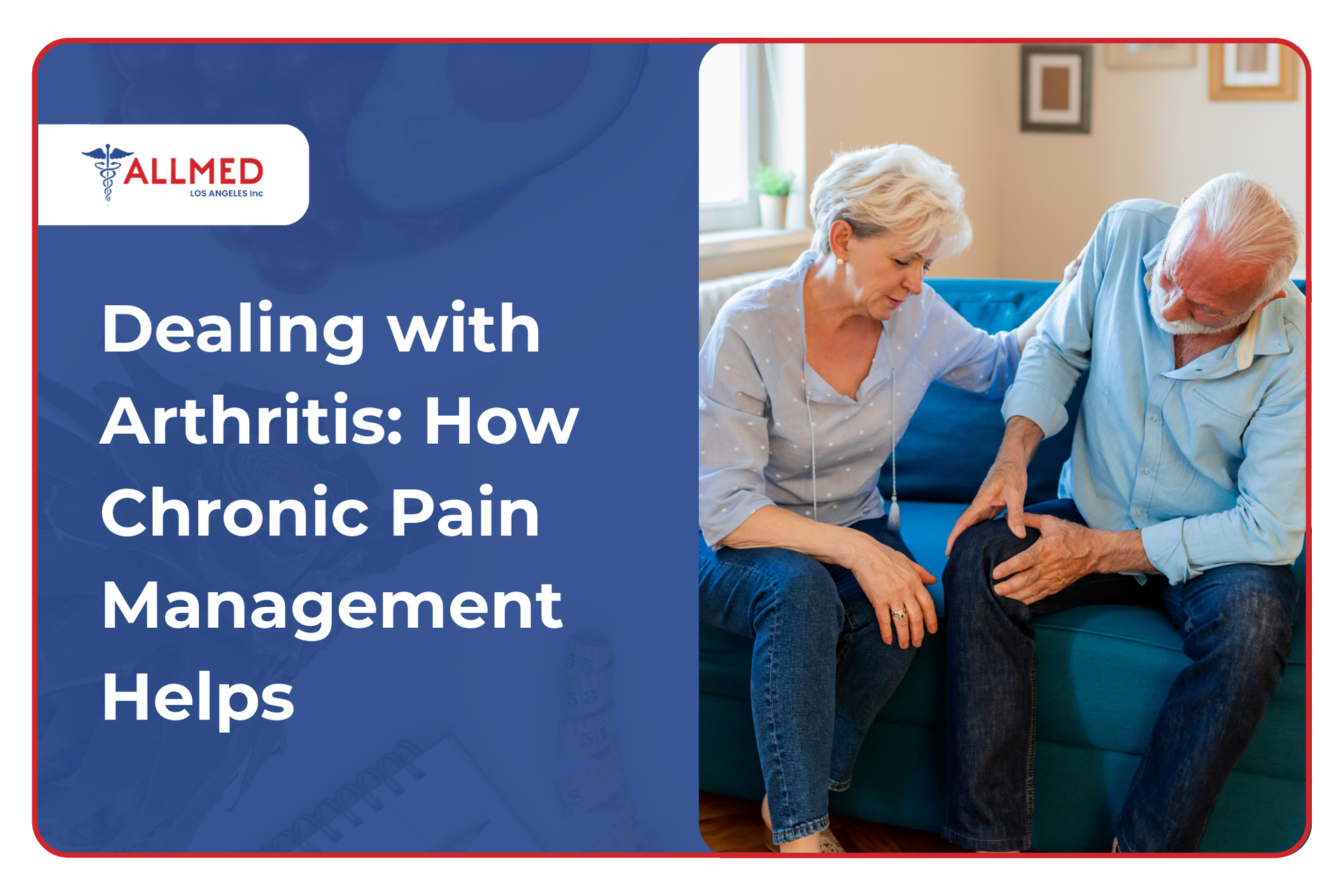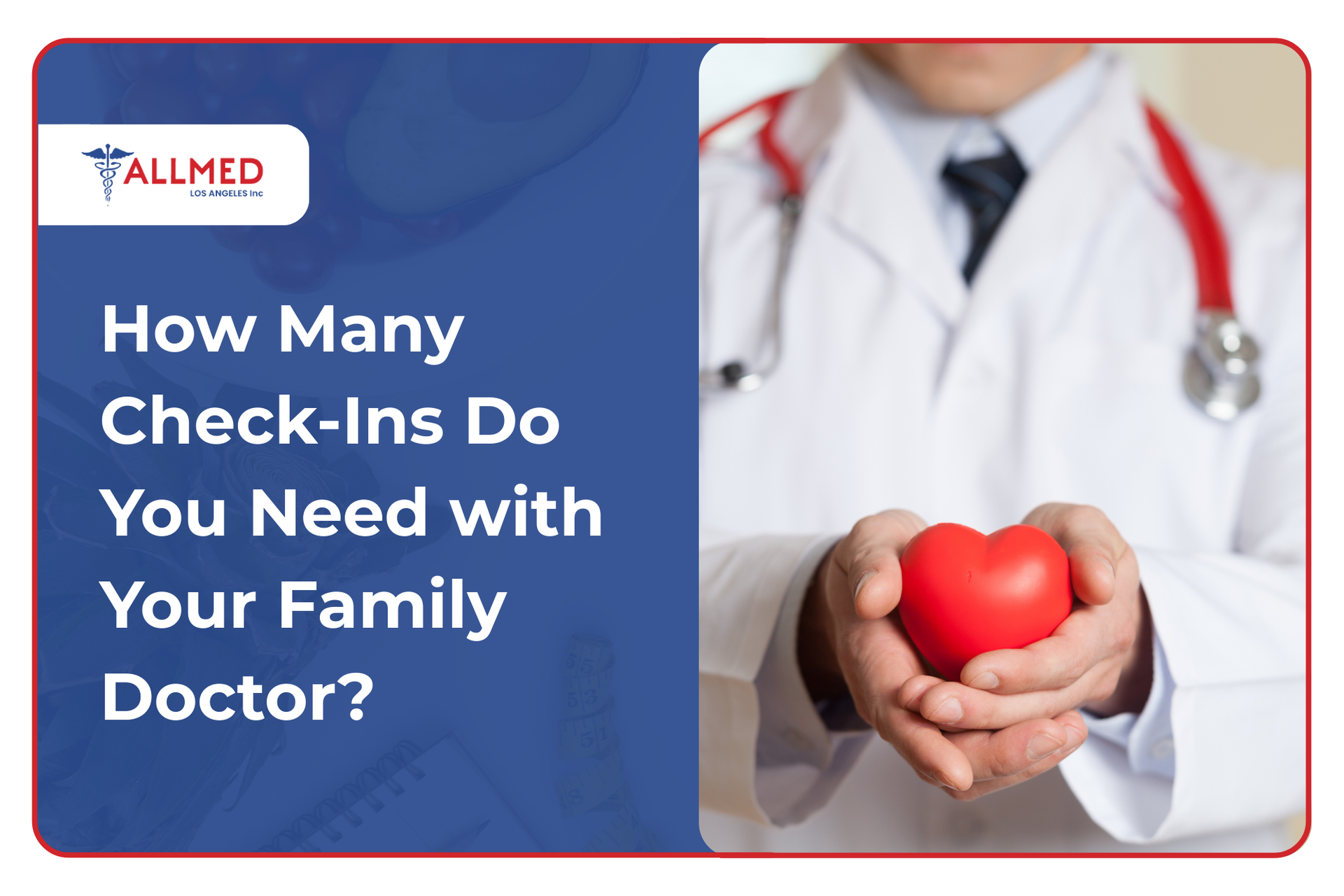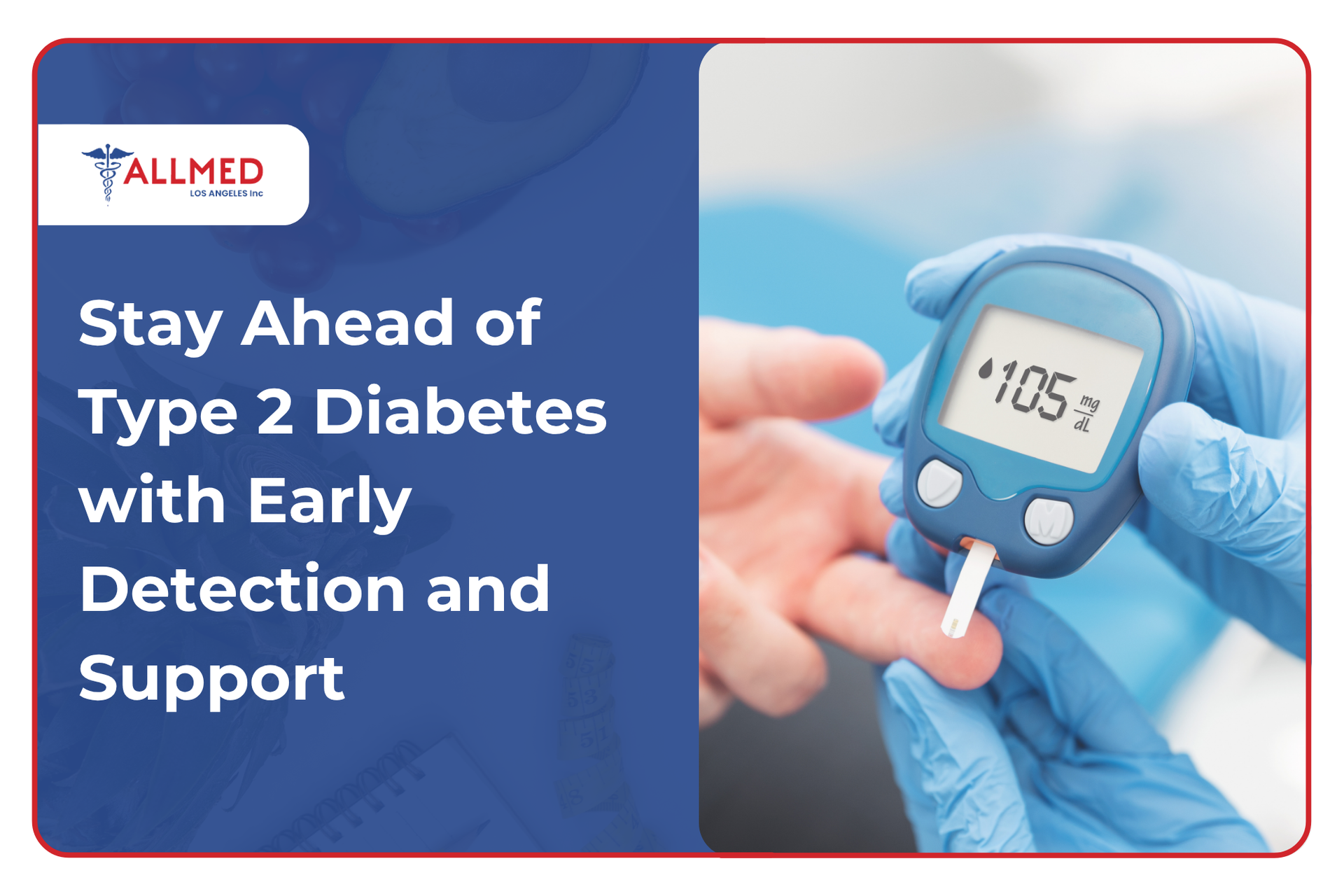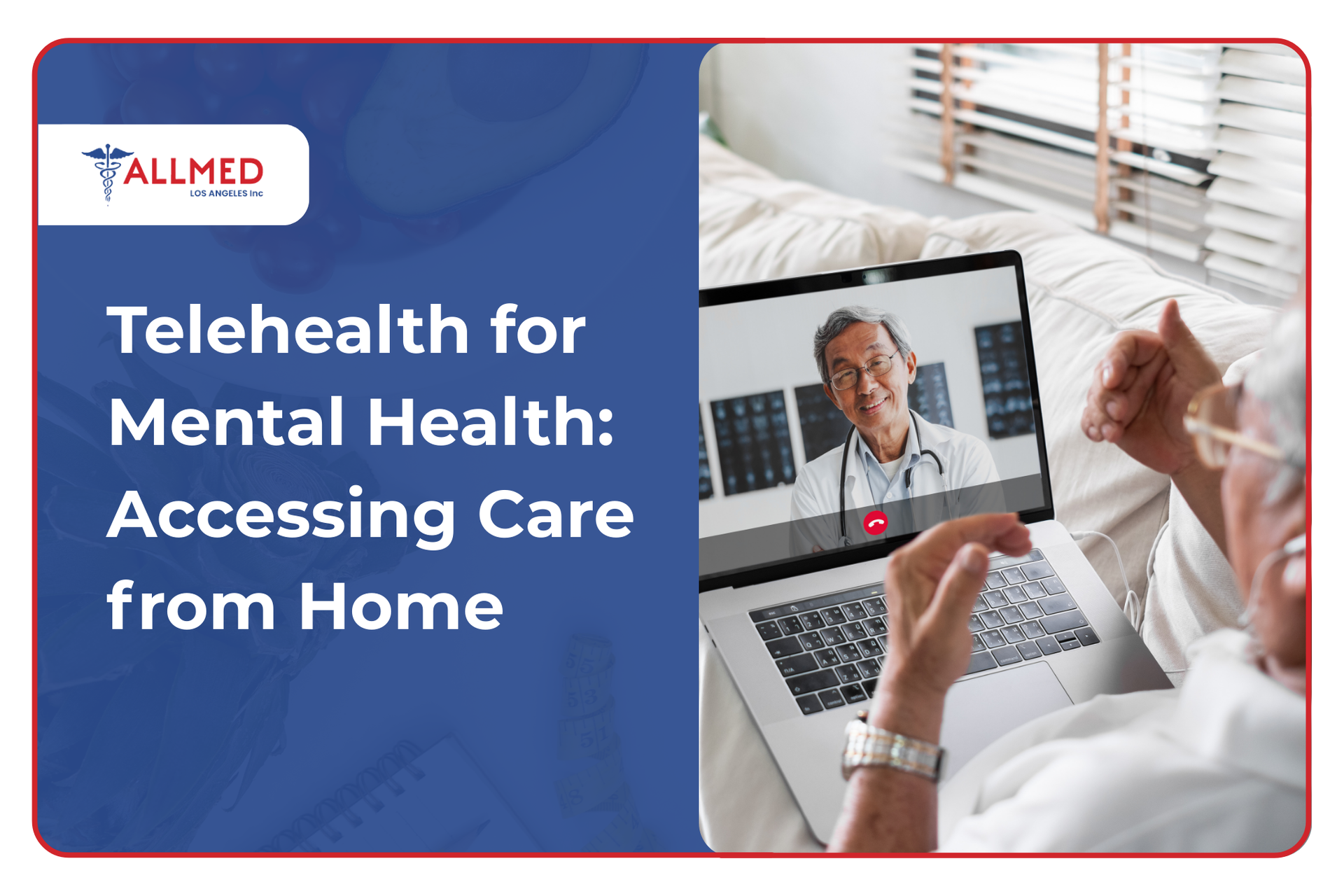Climbing the stairs, getting out of bed, or opening a jar—simple tasks like these can feel twice as hard when arthritis pain sets in. Beyond the stiffness and swelling, arthritis can take a toll on your independence, energy, and even your mood.
When daily activities become difficult, it’s common to pull back, avoid asking for help, and quietly endure the pain. But here’s what we want you to know: asking for help isn’t the same as giving up—it’s allowing your loved ones to support you.
Like your loved ones, we at Allmed LA are committed to helping you manage your arthritis pain with care, compassion, and proven solutions. With the right
chronic pain management plan, you can find comfort, improve your quality of life, and lean on a team that’s here to help you regain the activities you love and the quality of life you deserve.
Say Yes to Life Without Limits
Understanding Arthritis and Its Challenges
Arthritis affects 528 million people worldwide, according to the World Health Organization (WHO), which changes the way they move, work, and live. It’s not just one condition either. It’s an umbrella term for more than 100 different types of joint diseases.
While each type has its own causes and symptoms, they all share one thing in common: pain and stiffness that disrupts daily life, especially if you don’t have
proper chronic pain management. Let’s take a closer look at some of the most common forms:
- Osteoarthritis (OA): The most common form, caused by the gradual wear and tear of cartilage on the joints. It often affects the knees, hips, and hands.
- Rheumatoid Arthritis (RA): An autoimmune disease where the body’s immune system mistakenly attacks healthy joint tissue, leading to inflammation, pain, and potential joint damage.
- Gout: Caused by a buildup of uric acid crystals in the joints, which leads to sudden, severe pain. It often affects the big toe, but it can affect other joints, too.
- Ankylosing Spondylitis: This type primarily affects the spine, causing chronic back pain and stiffness.
- Psoriatic Arthritis: Linked to psoriasis, this type of arthritis causes joint inflammation, along with skin symptoms such as scaling and redness.
- Juvenile Arthritis: This occurs in children under 16, leading to joint pain, swelling, and stiffness that can interfere with growth and development.
No matter the type, apart from the pain and stiffness, many symptoms overlap, including:
- Swelling and tenderness in affected joints.
- Ongoing joint pain that may worsen over time.
- Limited flexibility or reduced range of motion.
Arthritis is often thought only to affect older adults, but that’s a misconception. It can affect people at any age (even children and young adults), changing the way they live, work, and move.
What is Chronic Pain Management?
Chronic pain management involves creating personalized care plans that give you long-term care and support designed to reduce pain, improve mobility, and regain your quality of life for people dealing with ongoing conditions like arthritis.
Is it all about taking medications?
Yes, part of it. But ultimately, true pain management takes a multidisciplinary approach that may include:
- Physical therapy & exercise to strengthen muscles and protect joints.
- Lifestyle changes for arthritis like weight management and an anti-inflammatory diet.
- Medical treatments tailored to your type of arthritis.
- Chronic pain and mental health support to cope with stress, anxiety, or depression.
- Alternative therapies such as acupuncture, massage, or heat/cold therapy.
Chronic Pain Management Strategies for Arthritis
What works for one person may not work for another, which is why pain management plans need to be personalized. Still, several proven strategies form the foundation of effective arthritis treatment.
Medications (with the right supervision)
- For adults: Arthritis treatment options may include over-the-counter pain relievers (like NSAIDs), prescription drugs such as DMARDs (disease-modifying antirheumatic drugs), biologics, or corticosteroids to manage inflammation and slow disease progression.
- For children: Treatment often focuses on specialized pediatric medications such as NSAIDs, methotrexate, or biologics, always prescribed and closely monitored by a pediatric rheumatologist.
Physical Therapy & Gentle Exercise
Movement may feel intimidating when you’re in pain, but staying active is essential. Physical therapy for chronic pain support helps by:
- Strengthening muscles that assist the joints.
- Improving flexibility and reducing stiffness.
- Teaching safe ways (like swimming or walking) to move without worsening symptoms.
Lifestyle Changes
Small changes can make a big difference. Try:
- Maintaining a healthy weight to ease joint pressure.
- Eating an anti-inflammatory diet in fruits, vegetables, lean proteins, and omega-3s.
- Staying active in safe, consistent ways rather than avoiding movement together.
Alternative Therapies
Many people find relief with
complementary approaches. These can be valuable additions to your primary care for arthritis, but always speak with your doctor first before trying anything.
Mental Health Support
Chronic conditions come with their own emotional tolls. That’s why it includes:
- Counseling or therapy to manage your mental health.
- Stress-reduction practices like meditation or deep breathing.
- Support groups where you can connect with others who understand the struggle.
How Chronic Pain Management Improves Daily Living
Managing arthritis pain is about helping you reclaim the parts of life that matter most. With the right approach, chronic pain management can bring real improvements you’ll feel day to day:
Improved Mobility and Independence
Less stiffness and more strength mean you can walk without concern, climb with ease, and simply enjoy life’s activities without pain.
Better Sleep and Energy Levels
Chronic pain often disrupts sleep. Pain management helps break that cycle, allowing for deeper rest and more energy throughout the day.
Reduced Reliance on Emergency Care
When unmanaged, flare-ups can send you rushing to urgent care or relying heavily on short-term fixes. A consistent pain management plan helps reduce those emergencies.
Enhanced Mood and Social Life
Relief from constant pain can lift the emotional burden, making it easier to connect with others, spend time with loved ones, and enjoy social activities without fear or discomfort.
Regaining Control of Your Life
Most importantly, effective pain management gives you back a sense of control. Instead of arthritis dictating your days, you can focus on living them fully and meaningfully.
Allmed LA’s Approach to Arthritis and Pain Management
This all sounds inspiring, but now you might be thinking, “This sounds great! But where do I even start?”
The answer? Allmed LA. To us, you’re our neighbor, our friend, and a part of our community. Our mission is to help you live with less pain, more independence, and the confidence to live fully again with:
- Personalized treatment plans built around your needs.
- Comprehensive pain management programs and telehealth services.
- A support team that’s here for the long haul to cheer you on in every aspect of your care.
Your journey toward better days starts with a single conversation. We’re here when you’re ready to have it.
Schedule Your Arthritis Care Today















